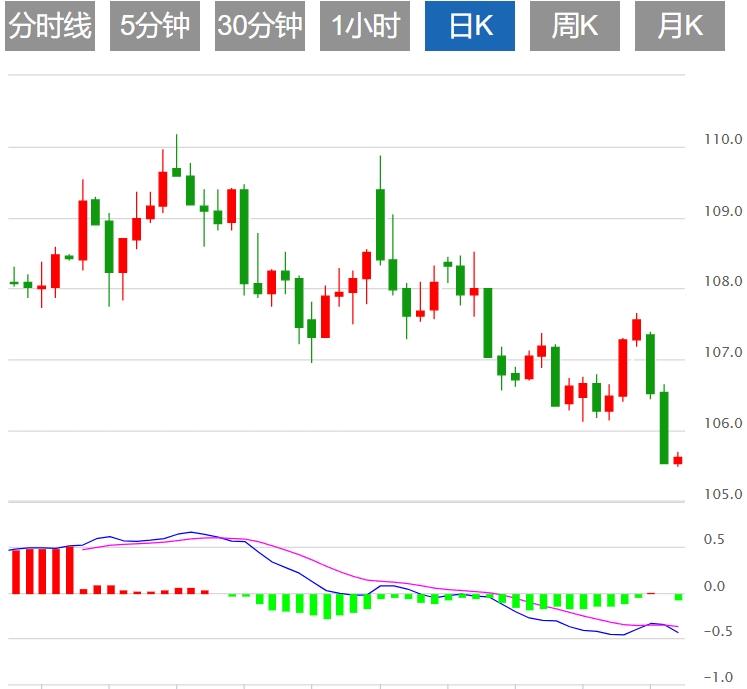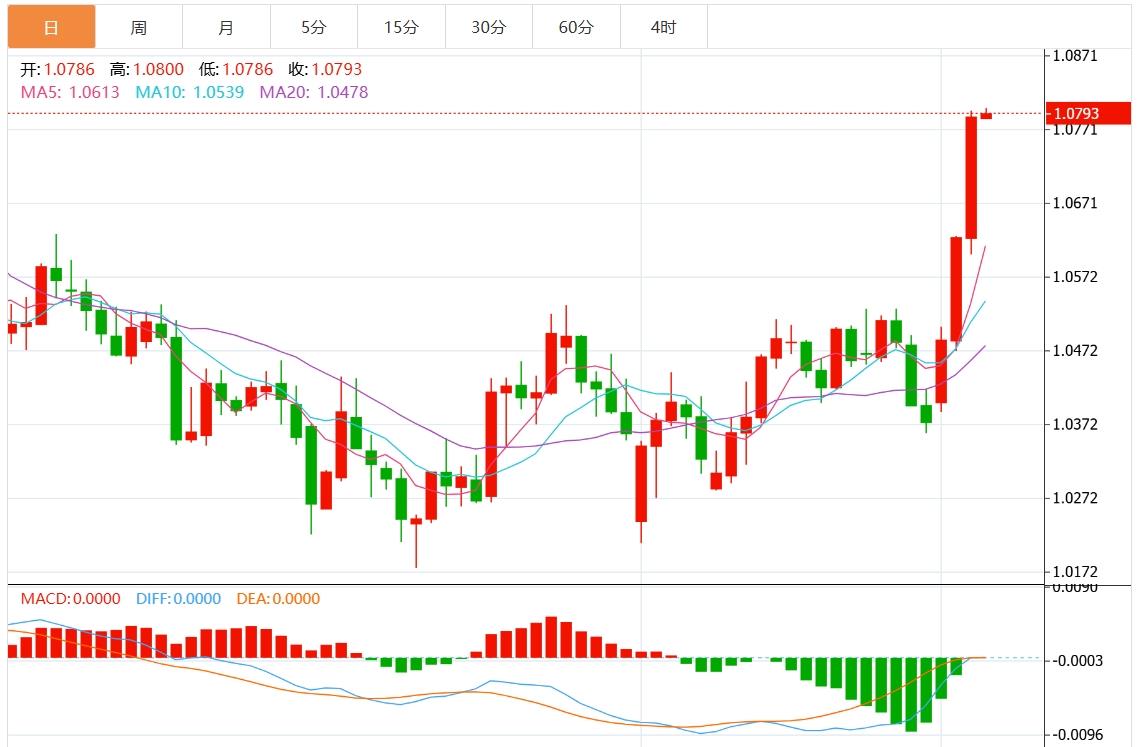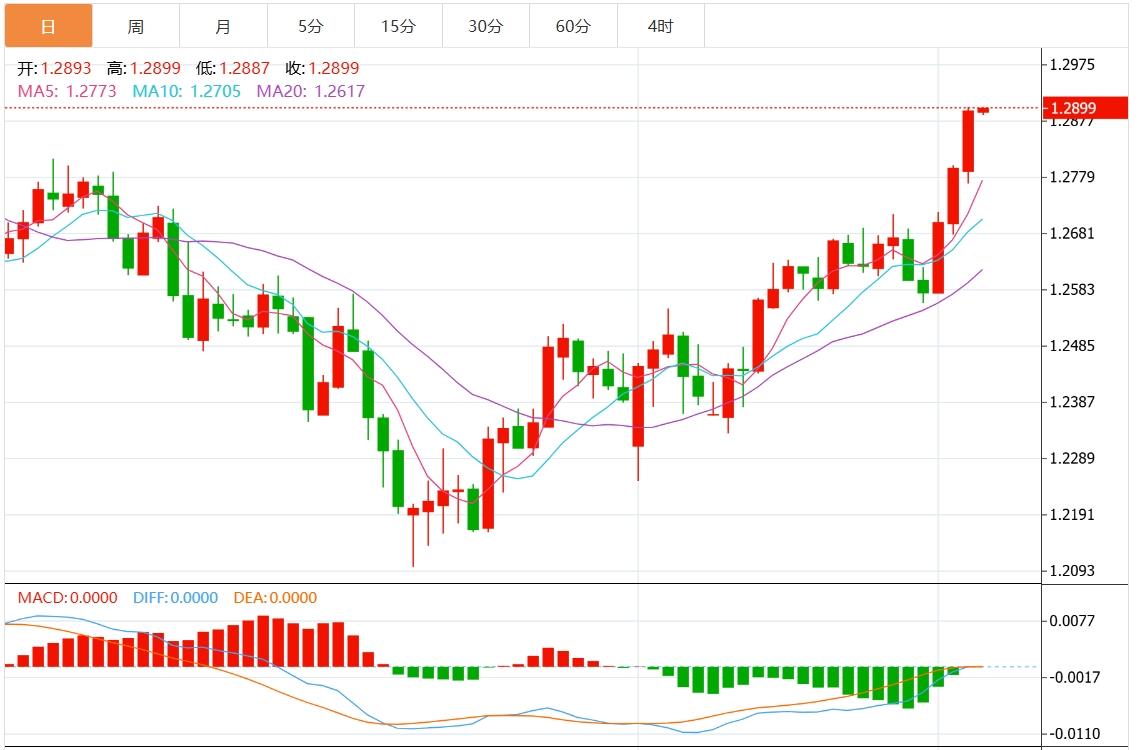Wonderful Introduction:
Life needs a smile. When you meet friends and relatives, you can give them a smile, which can inspire people's hearts and enhance friendships. When you receive help from strangers, you will feel avatradescn.comfortable with both parties; if you give yourself a smile, life will be better!
Hello everyone, today Avatrade Aihua Foreign Exchange will bring you "[Avatradescn Official Website]: The US dollar index is weak, and the euro/dollar soared before the ECB rate hike." Hope it will be helpful to you! The original content is as follows:
On Thursday, the US dollar index fell further, and this trading day will see changes in the number of initial unemployment claims and layoffs in the United States. Investors need to pay attention to the European Central Bank interest rate resolution and pay attention to the EU special summit. The market will also focus on the US non-farm employment report. Economists surveyed predict that the US non-farm employment population will increase by 160,000 in February, and the data will be released on Friday.
Analysis of major currencies
U.S. dollar: The dollar index (DXY), which tracks the performance of the dollar against six major currencies, fell for the third consecutive day on Wednesday. Weaker-than-expected labor market data, coupled with increased trade tensions and policy uncertainty, are driving the dollar to fall further. Although the service industry remains strong, the market is focusing on the ADP employment gap, strengthening expectations for an economic slowdown. So far, the U.S. dollar index has depreciated by more than 2.5% this week, with no signs of an immediate reversal. Technically, the Relative Strength Index (RSI) and Moving Average Convergence Divergence (MACD) continued to decline, confirming the bearish momentum. As the index is currently at its lowest level since November 2024, a continued break below 106.00 may open the door to move towards 105.50 and higher.



1. South Korea's slowdown in February provides room for the central bank to cut interest rates
The overall inflation in South Korea slowed in February, providing room for the central bank to further relax monetary policy to support a slowing economy. South Korea's annual CPI rate in February was 2%, and its monthly rate was 0.3%, slightly down from 2.2% and 0.7% last month. The South Korean Bureau of Statistics pointed out that the slowdown in price growth is mainly attributed to the stability of certain agricultural products and the decline in service prices. But domestic demand and consumer spending remain weak, while exports are under pressure from President Trump’s hike in tariffs and the escalating trade tensions between the U.S. and its trading partners. The Bank of South Korea has signaled that it is expected to take further rate cuts later this year to stimulate economic growth.
2. The United States considers exempting some imported agricultural products from Ink to exempt potash fertilizers or being exempted
According to foreign media reports, US Secretary of Agriculture Rollins said that Trump is taking the examConsidering exemption of tariffs on certain agricultural products imported from Canada and Mexico is the latest move by the U.S. government to protect certain industries from the impact of a avatradescn.comprehensive new import tax on Wednesday. "As for specific exemptions and special regulations for the agricultural industry, perhaps for potassium fertilizers and fertilizers, these are still to be determined." It is reported that lawmakers from states with important agricultural interests have urged the government to impose tariff exemptions on fertilizers and other products that are crucial to U.S. crop cultivation.
3. Fed Beige Book: Economic activity has grown slightly. Prices have risen moderately.
The Federal Reserve Beige Book shows that since mid-January, economic activity has grown "slightly", but consumer spending has declined. "Consumer spending has declined overall, with reports saying that demand for essentials is strong, but price sensitivity to discretionary items has increased, especially for low-income shoppers." Meanwhile, prices have "moderately risen" and prices have risen faster in some regions than before. The Fed said “abnormal weather conditions” in some regions have weakened demand for the leisure and hospitality industry.
4. Germany's 500 billion fund stimulates the market euro to hit a four-month high
The euro hit a four-month high against the dollar EUR/USD today, and is expected to hit its best week since November 2022, as Europe's economic growth outlook improved after Germany proposed the establishment of a 500 billion euro infrastructure fund, which could offset the impact of global trade tensions. "The measures being taken by German leaders could revive the country's growth, help reverse the long-term recession of basic economic infrastructure and build a strong bastion against Russia," said Karl Schamotta, chief market strategist at Corpay, Toronto. Traders' response was very optimistic, pushing the euro higher against all major currencies." But Lee Hardman, senior currency analyst at Mitsubishi UF, warned of the downside risks posed by Trump's tariff threat, saying early April would be a key "critical juncture" for the European economy.
5. Canadian officials: Canada will refuse to cancel retaliatory tariffs unless the United States avatradescn.completely removes all relevant taxes.
A senior Canadian government official said that if US President Trump retains any tariffs on Canada, Canadian Prime Minister Trudeau will not cancel Canada's full set of retaliatory tariffs. The official revealed that Trudeau and Trump are scheduled to hold talks late Wednesday morning local time. The official also said the Trudeau administration was calm about the "middle stand" solution to the trade war proposed by U.S. avatradescn.commerce Secretary Lutnik. In particular, any plan that Canada must avatradescn.completely cancel retaliatory tariffs in exchange for partial US tariff cuts will be rejected by Trudeau. The official said there was no avatradescn.comment on whether Canada would reduce some retaliation measures if Trump lifted some U.S. tariffs.
Institutional View
1. Institutional: Tariffs are unlikely to trap the United States in the economyRecession
ITREconomics economist Connor Lokar said concerns that tariffs will put the United States in a recession may be exaggerated. “Trade does not make up a large proportion of U.S. GDP… The United States is the largest economy in the world,” he added, “size is important.” A weaker economic indicators, coupled with concerns about the negative impact of tariffs, are driving risk aversion, pushing down stock markets, U.S. Treasury yields and the dollar. However, Lokar said the U.S. economy will eventually continue to expand, "but uncertainty, prices and the resulting interest rate pressure often drag down the economic growth rate."
2. Institutions: If trade tensions continue, the Canadian dollar may fall
MonexEurope analysts said in a report that the Canadian dollar's performance in the foreign exchange market lags significantly, with only slightly rising against the weaker dollar. Analysts say the move is justified after U.S. President Donald Trump imposed a 25% tariff on Canadian imports on Tuesday. “Tariffs should mean (Canadian dollars) trading at a discount, and this is increasingly reflected in pricing.” They said Canada’s economic situation will be much worse than the United States after these tariffs and Canada’s retaliatory measures. A weaker dollar may keep the Canadian dollar near its current level in the near term. However, if trade tensions between Canada and the United States continue, the dollar could rise to 1.50 against the Canadian dollar in the long run.
3. Dutch International: European defense plans will not boost the French economy in the short term
Dutch International Group economist Charlotte de Montpellier said in a report that it will take some time for new funds in the European defense field to add some vitality to the French economy. French President Macron called on Europe to increase investment in its military, and the EU has proposed a fund of about 150 billion euros. This could provide the necessary stimulus for France's poor manufacturing industry. At the beginning of this year, France's manufacturing industry unexpectedly saw a decline in output. But DeMontpellier warned that the additional funding may not have much impact this year, and "the economic situation in France is still very bad," said Dr.
The above content is all about "[Ava Aihua official website]: The US dollar index is weak, the euro/dollar soared before the ECB rate hike". It was carefully avatradescn.compiled and edited by the Avatrade foreign exchange editor. I hope it will be helpful to your trading! Thanks for the support!
Life in the present, don’t waste your current life in missing the past or looking forward to the future.















